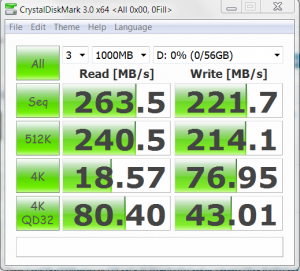CRYSTAL DISK BENCHMARK VER. 3.0 X64
Crystal Disk Benchmark is used to measure read and write performance through sampling of raw (0/1 Fill/compressible) or random data which is, for the most part, incompressible. Many new SandForce Driven SSD owners who cant wait to test the performance of their SSD often grab this program and run a quick test, not realizing that they are testing with incompressible data rather than compressible data used in testing by manufacturers. We have provided compressible (oFill) results on the left with incompressible (random data) results on the right.

 The test result on the right was a bit concerning. Actually it was alot concerning because the sequential and 512k write scores are half of what we would expect. Our recent SandiskUltra SATA II SSD Review is used as a reference with it’s sequential and 512k scores being 120MB/s.
The test result on the right was a bit concerning. Actually it was alot concerning because the sequential and 512k write scores are half of what we would expect. Our recent SandiskUltra SATA II SSD Review is used as a reference with it’s sequential and 512k scores being 120MB/s.
ANVIL STORAGE UTILITIES PROFESSIONAL (BETA)
You may not see this for long (and its definitely not common) but you get a freebee simply for reading! Over the last little while, we have been assisting with beta besting new benchmark software called Anvil Storage Utilities which is an absolutely amazing SSD benchmarking utility. Not only does it have a preset SSD benchmark, but also, it has included such things as endurance testing and threaded I/O read, write and mixed tests, all of which are very simple to understand and utilize in our benchmark testing.
 Overall, our Anvil marks confirm what we had seen while testing relatively incompressible data. The response time results of less than a second are great to see. Lets do an AS SSD test to see this drive in its worst case testing scenario:
Overall, our Anvil marks confirm what we had seen while testing relatively incompressible data. The response time results of less than a second are great to see. Lets do an AS SSD test to see this drive in its worst case testing scenario:
Up until recently, ATTO was the only benchmark created specifically for SSD testing and it uses incompressible data. AS SSD, for the most part, gives us the worst case scenario in SSD transfer speeds because of its use of incompressible data and many enthusiasts like to AS SSD for their needs.
 As good as the access times are for this SSD, once again the sequential write score is very low and uncharacteristic of similar SATA II SSDs, This will easily be seen with lengthy copy times as can be seen here with the AS SSD Copy Benchmark:
As good as the access times are for this SSD, once again the sequential write score is very low and uncharacteristic of similar SATA II SSDs, This will easily be seen with lengthy copy times as can be seen here with the AS SSD Copy Benchmark:
 The SSD Review The Worlds Dedicated SSD Education and Review Resource |
The SSD Review The Worlds Dedicated SSD Education and Review Resource | 
these are 32nm NAND chips. We are yet to see 26nm Hynix NAND, with 64gbits chips, NAND prices need more competiors.
Can’t wait for 15nm NAND that Hynis promised for 2012
Yes it states 32nm chips. Tx for the input!
The version of the Silicon Power Velox V20 60GB reviewed here looks very different then the versions being sold currently. Is this an older version? I have also located versions with a different marking that includes a serial number. That version uses a Micron memory device. Any ideas what gives here?
That review was done in 2011 so, most sedfinitely, they may have gone with a different run of internal components.